The Absent Therapist
Will Eaves
(CB Editions, 2016); pbk, £8.99
The Absent Therapist is a collection of narratives which defies straightforward definitions. It is composed of numerous fragments, with no singular story or plotline. Threads are returned to, picked up and re-spun, before being laid down again and the process repeated. This cyclical returning and exploration of numerous threads deposits the reader into the various perspectives displayed, engaging them in an honest portrayal of humanity: ‘Separate gates are a good idea, because ferrets tend to want to escape as a group.’
The portrayal of people is a triumph of Eaves’ book. Its fragmented structure has us visit the perspective of innumerable individuals, in completely contrasting states of living, as they too observe completely othered individuals. His use of language places the reader in the position of an interviewer – the speaking figures address the reader directly throughout the work. The manner of interview shifts as charged emotions and nascent conversations intermingle, capturing a sense of humanity in its entirety. Yet in these inter-connections, disconnection becomes a major theme of the book; between people, and of the self: ‘I must have been upset. I don’t remember.’
Throughout the novel, discontent, alienation, and an ‘othering’ of others continually emerge. Whether it be in the people who ‘laughed when [they] saw their head rolling across the road’, or others who ‘blank’ those they’ve met and promptly forgotten, Eaves shows a humanity that isn’t consolidated or together. It’s messy and honest. Even in regard to how people engage in the world:
You’re a nice, shy person, but you can’t be bothered to make an effort on anyone else’s behalf. And when someone else does, on yours, you resent it because of the glimpse it affords a better way of behaving.
Interactions between people are central to the novel. Hypocrisy rears its head numerous times, whether in the sex-negativity of an affair-having teacher, or in the stance of the anti-gay Right, whose arguments fail as soon as they are posed the question of if ‘they not want lesbians and gay men to go to church?’
The theme of humanitarianism appears again and again.
the refugee camp […] is to be closed. [… Our sons] will face great danger. We think of them at this time, and we would ask that you say a silent prayer for them, too.
This reaching out of the page is done many times, as with this direct question: Where do you get your tired ears from?
Eaves is dropping the borders that exist between the reader and the stories he writes. Indeed, despite the multitudes of perspectives we see, there remains a feeling of the author himself speaking; that each individual is another voice for him to project his own feelings. The final fragment is deeply reflective, a gay man thinking back to growing up, the loss of innocence, the engagement of self-discovery, and the pain it can bring:
My ghost behind her now says: it is my conscience at war with itself. I have a secret. I would like not to have one. The secret is hiding its meaning the longer I keep it.
Despite the trauma that exists throughout the book and the fraught and violent disconnections, there remains a hopefulness, a flipside against the darkness, a peaceful interconnectivity: ‘A lady sits on her balcony four floors up, talking to a man in the apartment. Voices carry and fade, carry and fade.’
Throughout it all, there is a continuous sense of believing in humanity. Despite all the hurt, pain and suffering, life is still worth it: ‘You Are a Precious Gift from God. Drive Safely.’
James McLeish


Leave a Reply